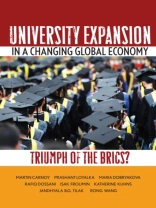This is a study of higher education in the world’s four largest developing economies—Brazil, Russia, India, and China. Already important players globally, by mid-century, they are likely to be economic powerhouses. But whether they reach that level of development will depend in part on how successfully they create quality higher education that puts their labor forces at the cutting edge of the information society.
Using an empirical, comparative approach, this book develops a broad picture of the higher education system in each country in the context of both global and local forces. The authors offer insights into how differing socioeconomic and historic patterns of change and political contexts influence developments in higher education. In asking why each state takes the approach that it does, this work situates a discussion of university expansion and quality in the context of governments’ educational policies and reflects on the larger struggles over social goals and the distribution of national resources.
Sobre el autor
Martin Carnoy is the Vida Jacks Professor of Education, Stanford University. Prashant Loyalka is Center Fellow, Freeman-Spogli Institute, Stanford University. Maria Dobryakova is Research Fellow, National Research University-Higher School of Economics, Moscow. Rafiq Dossani is Senior Economist, Rand Corporation. Isak Froumin is Academic Director, Institute for Educational Studies, National Research University—Higher School of Economics. Katherine Kuhns is an Independent Consultant at West Ed and Gallop Ventures and a former Lecturer at Stanford University. Jandhyala B. G. Tilak is Professor and Chair of Educational Finance, National University of Educational Planning and Administration, India. Rong Wang is Director, China Institute for Education Finance Research, Peking University.












